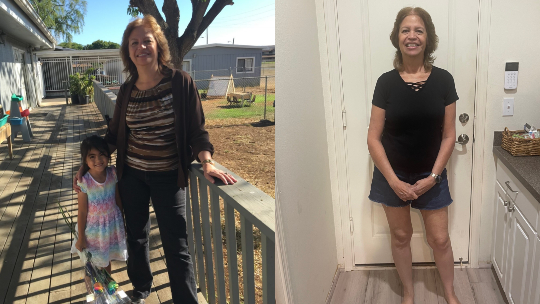Robin Aki was feeling sluggish and tired. It was tough to keep up with her young granddaughters. One day, she noticed that she had to buy clothing in a larger size.
“It just hit me that I gained 30 pounds. I said to myself, ‘What am I doing?’” says Aki, senior manager of government programs for Medicaid at HMSA. “I’m planning to retire soon and I want to go into the next phase of my life healthy.”
Her transformation wasn’t easy. It took hard work, discipline, and dedication.

Left: Aki with one of her granddaughters in 2022; Aki in 2024. Photo courtesy Robin Aki
“I wanted some magic pill or drink that would help me lose the weight, but I finally realized there was no such thing,” says Aki.
A lifestyle change
Aki is a self-proclaimed foodie. She indulges in a variety of cuisines, from Korean to local foods like hamburger steak doused in gravy.
“The problem is, I hate to exercise and that’s a recipe to gain weight,” says Aki. “I was already on a slippery slope before the pandemic. Once the shutdown started and we began working from home, I ate more. I had snacks everywhere.”
Aki knew she had to overhaul how she approached food and fitness, so she started walking. She put in steps on the treadmill, around her neighborhood, and with her dog and grandkids. She also decided to try eating using a points-based nutrition system.
“It was a lifestyle change,” says Aki. “I started watching what I ate, cut out certain foods, and ate less.”
Under a points-based system, food and drinks are assigned a point value. You’re allowed a certain number of points each day. Foods high in fat and added sugars have higher points, making it more challenging to fit in your daily point budget.

Filling up on lean protein and vegetables is one way to stay within your daily point budget.
“It can be a good way to become more mindful of your food choices,” says August Espinal, HMSA manager of Condition Care Programs and a registered dietitian. “Over time, it may help you build better habits in making healthier food choices.”
“I used to eat until I couldn’t breathe and I’d get heartburn and indigestion. Now I know what my limits are,” says Aki. “My cravings started to lessen and became easier to manage. And even if I have a cheat day, I know I can get right back on track.”
Transformation begins
Changes came within a month. Aki saw the number on the scale gradually slide down, which motivated her to keep working hard and putting in the effort. But it wasn’t just about her weight; Aki felt healthier, too.
“I live in a two-story house, and before, I could barely walk up the stairs. But my stamina has increased,” says Aki. “Last October, I took three of my granddaughters to Disneyland and I walked around and went on all those rides without any problems.”

Aki's stamina has improved, allowing her to stay active while traveling. Photo courtesy Robin Aki
New phase ahead
For those looking to take on a similar well-being transformation, it’s important to remember that while diet and physical activity are important, there are other factors as well.
“All aspects of your lifestyle affect your overall health, including stress, sleep, and your environment,” says Espinal. “Talk with your doctor or dietitian to determine the best approach for your overall health and well-being.”
As for Aki, she’s looking at her retirement next year with a new sense of excitement.
“It’s been a journey. I wanted the next chapter of my life to be relaxing, not dealing with health concerns,” Aki says. “I wanted to get healthy for my grandkids. And now I feel so much better.”




